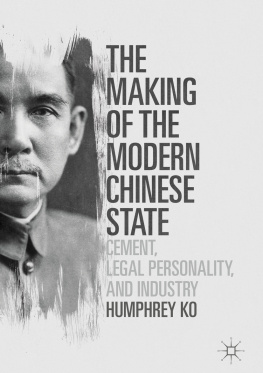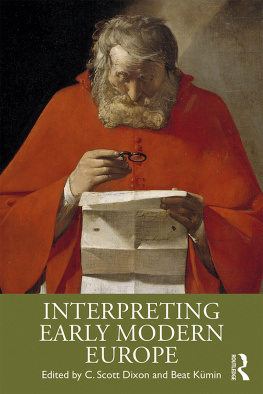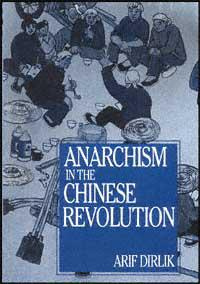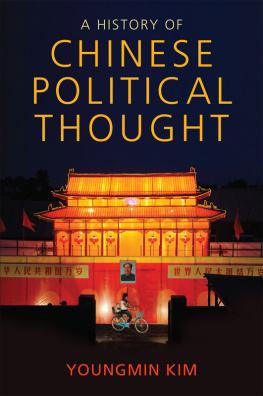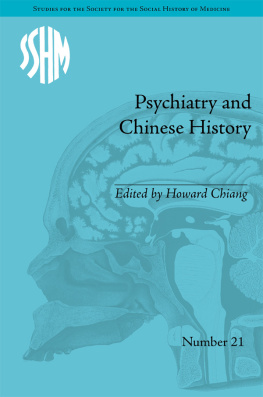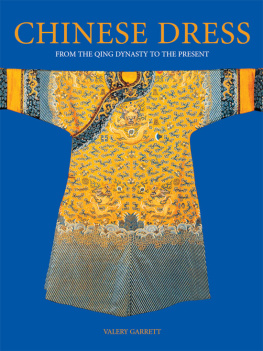Reinventing Modern China
Imagination and Authenticity in Chinese Historical Writing
Huaiyin Li

University of Hawaii Press
Honolulu
2013 University of Hawaii Press
All rights reserved
Library of Congress Cataloging-in-Publication Data
Li, Huaiyin.
Reinventing modern China : imagination and authenticity
in Chinese historical writing / Huaiyin Li.
p. cm.
Includes bibliographical references and index.
ISBN 978-0-8248-3608-5 (cloth : alk. paper)
1. ChinaHistory20th centuryHistoriography. I. Title.
DS734.7.L4565 2012
951.05072dc23
2012010500
ISBN 978-0-8248-3726-6 (digital)
Contents
Preface
A s a study of Chinese historiography on modern China, this book is to some degree also a reflection of my journey in the field of modern Chinese history in China and the United States over the past thirty years. My training in history began in the early 1980s, when I was a history major and later a graduate student at the Institute of Modern History of the Chinese Academy of Social Sciences. The 1980s, as it turned out, was a turning point in the development of Chinese historiography in the twentieth century. It witnessed an unprecedented prosperity as well as a looming crisis of the discipline. Beginning with the refutation of the ultrapoliticization of historical writing in the radical years under Mao, historians who survived the Cultural Revolution committed themselves to serious academic research in each field of history, resulting in the proliferation of monographs and journal articles, and heated debates on major historical issues at frequently held symposiums. But much of the booming scholarship took place in the context of analytical tools, conceptual frameworks, and explanatory schemes inherited from the preCultural Revolution period; in other words, historical research was conducted under the same paradigm that had been established in the field since the 1950s, despite some innovative reinterpretations that were intended to serve the present-day needs of the reform era. Without a breakthrough in interpretive schemes and relevance to the ongoing economic and political realities in the 1980s, the revived Marxist historiography soon lost its appeal to the general public and a new generation of undergraduate and graduate students in the field, hence the so-called crisis in history (shixue weiji), in sharp contrast with the popularity of history in the Mao era.
As expected, much of the first semester in my graduate program was spent on reading the original works of Marx and Engels to ensure that the Marxist principles of historical materialism were properly comprehended. My exposure to a wide range of topics and source materials in the field in the three remaining graduate years, especially the months I spent on the archives of the famous industrialist Zhang Jian (18531926), the topic of my master's thesis, proved to be much more enriching and stimulating; what particularly intrigued me was how his Confucian values influenced his business management and his planning of a comprehensive enterprise of modernization in Nantong. This issue, however, did not interest the senior historians in the Marxist tradition. Therefore, to my dismay, I was instructed to demonstrate, in typical Marxist fashion, how Zhang's economic activities affected his political attitudes, or, more specifically, how Zhang's personal connections and conflicts with government officials in conducting business accounted for his leading role in the Constitutional Movement in the last decade of the Qing. My thesis was thus written, but it never satisfied me.
My rebellion started well before I graduated from the program. It was triggered by my encounter with a copy of Paul Cohen's Discovering History in China (Columbia, 1984), which the author presented to one of my teachers at the institute shortly after its publication. That book kindled my interest in the modernization construct in postwar American historiography of modern China that Cohen criticized. I was soon attracted to more English-language titles on the theory and comparative history of modernization; the result was my article published in Shehui kexue pinglun (Social science review, 1986, no. 11), which I believe was one of the earliest attempts to introduce Western studies on China's modernization to the audience in mainland China. After graduating in 1987, I spent the next six years collaborating with Professor Luo Rongqu of Beijing University on his project of comparative study of China's modernization and working on my own project that tried to reinterpret some of the basic issues in modern Chinese history under the rubric of tradition and modernization, culminating in a coauthored book, Zhongguo xiandaihua de lishi toushi (China's modernization in historical perspective), eventually published in 1994.
After 1993, as a doctoral student at the University of California, Los Angeles, and later as a faculty member at the University of Missouri at Columbia, I concentrated primarily on the study of rural Chinese society in the nineteenth and twentieth centuries. Having been exposed to different types of academic training and different historiographical traditions on the two sides of the Pacific, I emphasized in my own study of rural China a combination of macroanalysis of long-term historical trends and formal institutions, on the one hand, with microhistorical study of informal local practices that shaped villagers everyday behavior in community life and in interacting with the state, on the other, as embodied in my two recent books, Village Governance in North China, 18751936 (Stanford, 2005) and Village China under Socialism and Reform: A Microhistory, 19482008 (Stanford, 2009). During these years Chinese historiography also underwent tremendous changes, most noticeably the triumph of the modernization paradigm, largely based on modernization theory borrowed from the West, in place of the Marxist revolutionary paradigm that had dominated the field since the 1950s, and more recently the rise of a new generation of scholarship that departs from both the revolutionary and modernization paradigms and instead centers on social and cultural phenomena that were largely overlooked before and builds its interpretations mainly on the basis of imported postmodern critical and historiographical theories. Therefore, by the time I started my new job at the University of Texas at Austin in 2006, I realized that I had arrived at a point where I was in a position to look back and rethink the methodologies and perspectives that had shaped the interpretation of modern Chinese history in twentieth-century China.
This project scrutinizes the varying interpretations of modern Chinese history in chronological order, spanning the Republican period down to the present. Given the large number of Chinese historians involved in the field, the wide range of topics covered by their scholarship, and the multiplicity of methodologies they employed in historical writing, it is impossible to offer an exhaustive account of the richness and diversity of their historiography in the past century. Instead, in this study I highlight the different master narratives of modern Chinese history, the interpretative schemes that bolster the narratives, and the changing interpretations of the major historical events under the master narratives. To explicate the diverse and contradictory representations of modern China, I focus on the most prominent historians in China who contributed to the construction or deconstruction of a master narrative, and inquire into their academic training, intellectual inclination, and, most important, the specific political circumstances of their times that motivated their writing.


